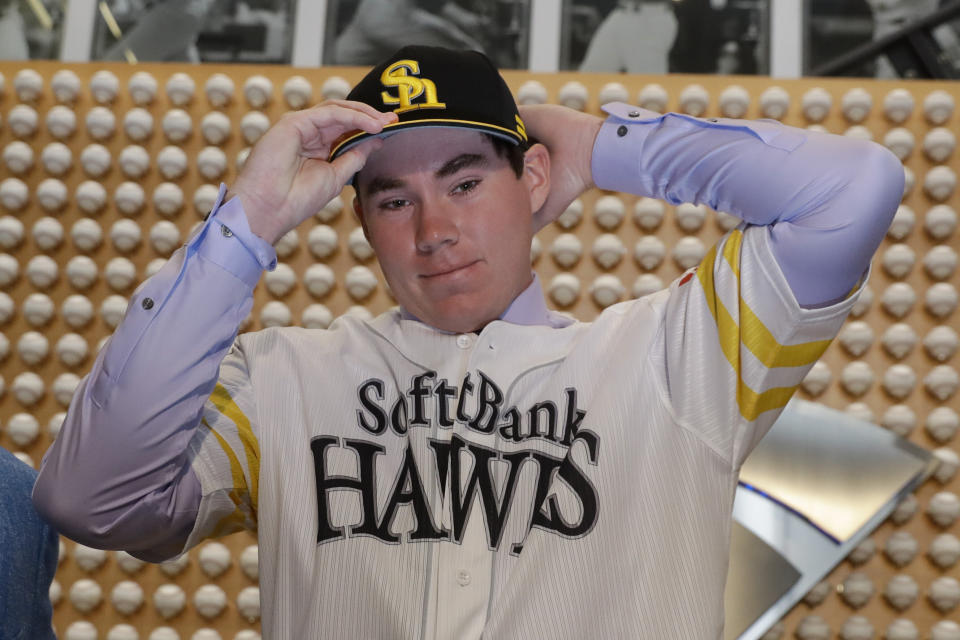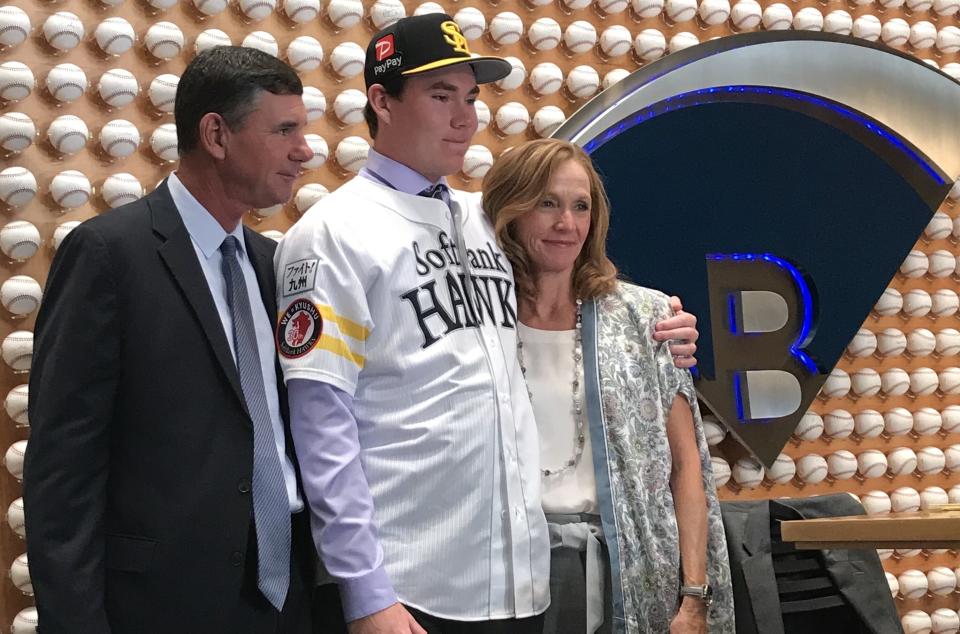The Land of the Rising Arm: Can Japanese baseball actually be a competitive alternative to the minors?

NEWPORT BEACH, Calif. — Let’s say the $11 billion baseball industry let down the young man with the big fastball and hyper-spin curveball, that it is letting down hundreds more like him, that there is a better way and it exists far away, and that all it takes to get there is a lot of talent and a spritz of adventurousness.
Let’s consider Japanese baseball as the competitive alternative to an industry gone unchallenged for more than a century, that suddenly there is a place where wages are fairer and accommodations are reasonable and the life is livable instead of survivable, that it is, as agent Scott Boras described it, “The Land of the Rising Arm.” That this is a place where the baseball, in the development of players and the product itself, is close enough, similar enough and financially healthy enough to be an option.
Let’s grant, for the moment, that Boras could be right, that the process by which American baseball procures and compensates its talent, especially its new talent, is rigged against the player. That a system in which a draft pick is considered so precious a franchise will threaten to trash an entire baseball season to preserve it also seeks to tamp the value of that very draft pick.
Let’s allow for all of that and then watch a 19-year-old pitcher named Carter Stewart thank his parents for, he said, “Being the only reason I’m here today,” and his father, Scott, place his hand on his wife, Pat’s, knee, and she tilt her head onto his shoulder, and the two of them share tight smiles that hold back tears.
Maybe there’s a decent gripe to be had here, that Stewart, the eighth overall pick by the Atlanta Braves a year ago, was jerked around, that his reward was to re-enter the same draft, the same system, a year later, and that his value would be deflated because of the process that put him back in the draft. And maybe this is what happens when a young man and his family and his representation get the kind of news they don’t want to hear, that there could be a physical flaw that could hinder his ability to throw baseballs for a living. It’s impossible to know, other than to see the Braves suddenly halve their offer and the young man tell them to keep their money and the agent view this as another example of a thoroughly and increasingly unfair process.
“There are eyes on the great players in America,” Boras said Thursday morning in the lobby of his headquarters. “There are opportunities beyond Major League Baseball, where these players can go and develop and do so in a system that is as good or better. And in a system where the treatment, the compensation and the lifestyle is much better than what is offered in the minor leagues. We certainly have the ability to make those corrections. To make it better.”
There is a broader conversation to be had about a brand of game that in recent years has produced Masahiro Tanaka, Shohei Ohtani, Kenta Maeda, Yu Darvish and Yusei Kikuchi, and that would pay Carter Stewart $7 million (plus incentives) over six years as a 19-year-old, in part to develop him into a better pitcher.
And yet the debate over whether the minor-league system is adequate simply because it is the only system we have ever known, or over what this says – or should say – about a hard-slotted draft compensation structure, or over when the search for competitive balance becomes nothing more than a way to keep labor costs manageable, does little to describe what is ahead for the 19-year-old in a gray suit and lavender shirt who has his hands folded stiffly in his lap.
Maybe it’s a test case for some, his signing with the Fukuoka SoftBank Hawks of Nippon Professional Baseball. An opening of the gates for others. Kind of a risky play for still others.

For Carter Stewart and his father, Scott, a 55-year-old aerospace engineer, and his mother, Pat – “I stay home. I’m Carter’s manager,” she said with a laugh – it is something so much more. It’s what happens when your youngest son goes off to start his own journey, not three years after your elder son dies. It’s getting on a plane, the three of them with various Hawks and Scott Boras Corp. employees, on Friday morning. It’s the details of a move of nearly 8,000 miles, of your boy testing himself against this thing that’s not been done before, of Scott and Pat returning to an empty house in Melbourne, Florida.
“We’re excited for him,” Pat said.
“It’s just geography,” Scott said. “And she” – he nodded to Pat – “is gonna teach him how to cook.”
And that made Pat laugh.
“We tend to teach our children to think outside of the box,” Scott said. “If it makes sense sometimes that’s the best way to go.”
So you wonder if this quiet, composed young man, Carter, might just have a daring spirit, if he seeks new experiences beyond others, if he always wondered what else was out there, and he paused to consider that about himself.
“Um, yes, yeah, I’d say so,” he said.
And the most adventurous thing, he said, cornered by a question, was, “Lots of things. I mean, you talk about some of the stuff I’ve done as a kid with my friends, going out ‘til 1 o’clock in the morning playing manhunt in the middle of the street.”
His father grinned and said, “Play golf with him, you’ll see some adventure.”
Carter, a terrific golfer, smiled and continued, “Actually, one big thing is junior college. That was something different for me. I know it’s not quite the same thing as traveling, but it’s something very different transitioning between high school to college and playing at a different level.”
Pat explained that Carter has a sound outlook on life, in part as a consequence of his brother, Hyde, dying. That the two had been “super close.” That it has been a difficult three years for Carter, for them all. That they’re finding their way through it.
“The perspective,” she said, “of what’s important and what’s not. And what makes you happy.”
For the moment, and with any luck for the next six years at least, that’s a contract to play ball in Japan. A reporter from there asked him Thursday if, given his 6-foot-6 stature, and the velocity of his fastball, if he thought of himself, “Perhaps as a monster?” He laughed.
The better question, in light of what his signing was to have said about the industry he spurned, would have been whether he’d created one. But that will wait. The larger issues are a plane to catch, an apartment to furnish, a culture to embrace, a professional game to learn. And, still, the cooking lessons.
More from Yahoo Sports:


